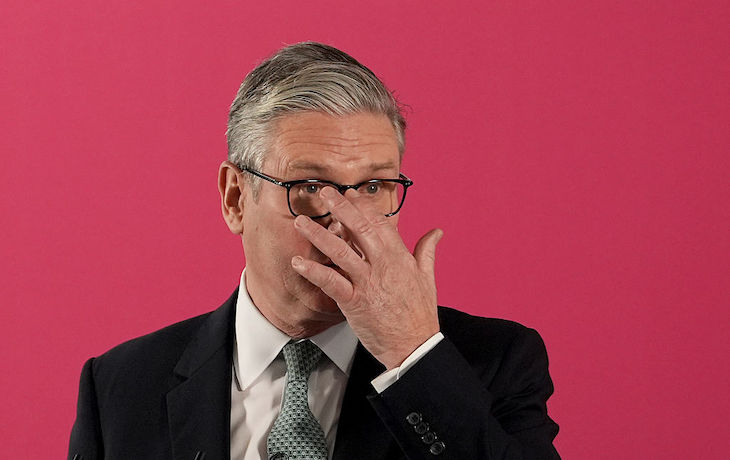In the eight months since he was appointed Secretary of State for Defence, John Healey has undertaken so many foreign visits that his residency status must be dubious. The Yorkshireman, who turned 65 last month, has travelled to Ukraine, Estonia, Poland, Germany, Belgium, Israel, Cyprus, Turkey, Saudi Arabia, Norway and the United States. On Wednesday, he returned to Washington for a meeting with his American counterpart, Pete Hegseth.
It is a marker of these extraordinary times and the volatility of President Donald Trump’s instincts – they are not policies in any meaningful sense – that British ministers visiting Washington do so with trepidation. On the agenda for Healey were the possibility of a ‘peace’ plan for Ukraine, Europe’s role in the agreement and America’s decision to suspend first military aid to Ukraine then intelligence-sharing. With masterful understatement, the Ministry of Defence described these as ‘political discussions’.
Healey knows he must listen to Washington say something is black, then enthusiastically agree that it is white
British ministers currently have to manage a degree of cognitive dissonance: for political reasons, they must be seen as supportive of the Trump administration and enjoying excellent relations. The barely concealed truth is that at the moment the two countries have very different foreign policy visions.
Ukraine is at the heart of this. On his arrival, the Defence Secretary told the media ‘we are on the path to peace’, which is just about a supportable proposition if peace is left undefined and the length of the path is accepted as indeterminate. But everyone knows the reality of the situation.
Trump wants the conflict in Ukraine to end, is comfortable with Vladimir Putin achieving many of his war aims and will not hesitate to put any possible pressure on Volodymyr Zelensky to force him to comply. The British government, which recently signed a 100-year partnership with Ukraine, is proposing a draft peace agreement which would guarantee Ukraine’s sovereignty and security, continue the supply of military aid and maintain economic pressure on Russia. The Prime Minister regards some kind of US backstop as essential, while Trump has all but ruled it out.
Healey is a pragmatist. He knows he must listen to Washington say something is black then enthusiastically agree that it is white. Sometimes diplomacy requires this kind of self-gaslighting of sensible politicians. But they must remember in the privacy of their own minds that they are enunciating, like the Red Queen, six impossible things before breakfast.
Trump has no obvious minimum demands of Russia. He has steadfastly refused to criticise Putin, while barely hiding his loathing for Zelensky; suggested strongly that Russia will retain the 20 per cent of Ukrainian territory it has seized; and requires Zelensky to sign an agreement which gifts the United States a substantial proportion of the profits from the future monetisation of Ukraine’s resources and minerals.
This exercise in stealing the wallet of a man who has been mugged is not easy to reconcile with the UK’s stated position. When Sir Keir Starmer took office, he declared that ‘we will support Ukraine with whatever it takes, for as long as it takes to uphold our shared values and our shared security’. That seems like another era. President Trump’s recent decision to suspend intelligence-sharing has compromised the UK’s relationship with Ukraine: our data collection and analysis is so intimately intertwined with that of the United States that we can now only supply our own analysis of raw data, forced to withhold anything from shared sources.
Simply, suspending intelligence-sharing will cost Ukrainian lives. Ukraine will be less able to detect incoming ballistic missiles and airstrikes from Russia, and they can no longer use their American-supplied M142 HIMARS rocket launchers because they rely on targeting data from the United States. Compromising Ukraine is the point: Trump’s special envoy to Ukraine, Keith Kellogg, said the decision was ‘sort of like hitting a mule with a two by four across the nose. You get their attention.’
Healey emphasised that the UK understands the changed strategic situation. ‘You challenged Europe to step up,’ he said. ‘You challenged us to step up on Ukraine, on defence spending, on European security. I say to you that we have, we are and we will further.’
Hegseth, a one-club golfer preoccupied with instilling ‘warrior culture’ at the Pentagon, may appreciate these efforts. Like the President, however, he has persuaded himself that forcing Ukraine into a wretched capitulation is not only pragmatic but noble. ‘The President got elected to bring peace in this conflict, and he is working with both sides in a way that only President Trump can … to bring them to the table to end the killing.’
This fracture in the special relationship will be hard to bridge. Trump does not care about a just settlement; worse, he relishes power to browbeat and humiliate Zelensky. He is similarly unconcerned by what European countries do in Ukraine after a ceasefire, but he has no appetite for America to be involved because he sees no immediate advantage to it.
It is hard to see even a canny operator like Healey changing Trump’s attitude. Once the President has reached an agreement with Putin, whom he likes, it will be, to quote one of his predecessors, ‘mission accomplished’. The UK’s task is to plan for that outcome realistically. As he flies back to Britain, John Healey will know that there are hard days ahead.








Comments